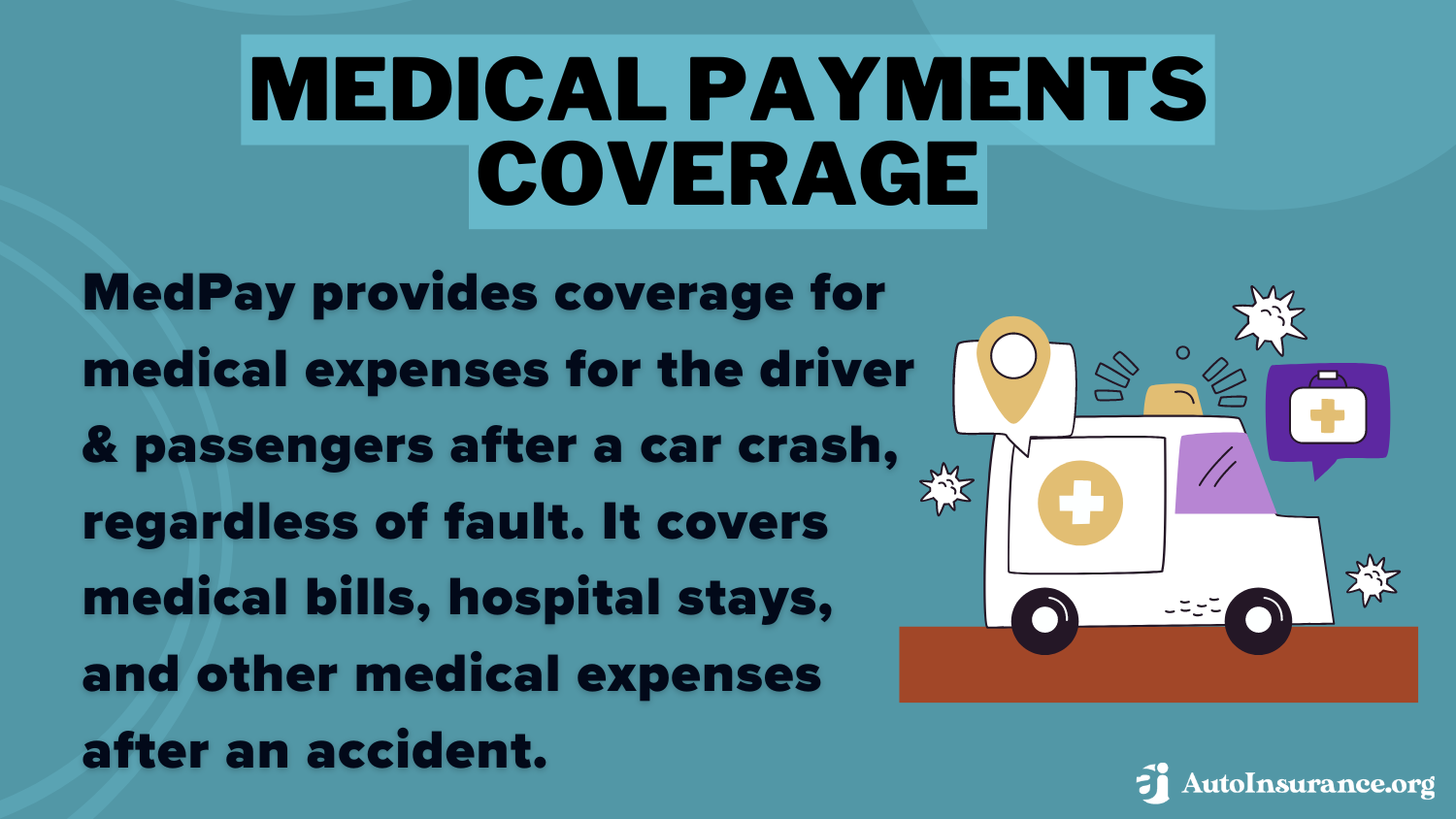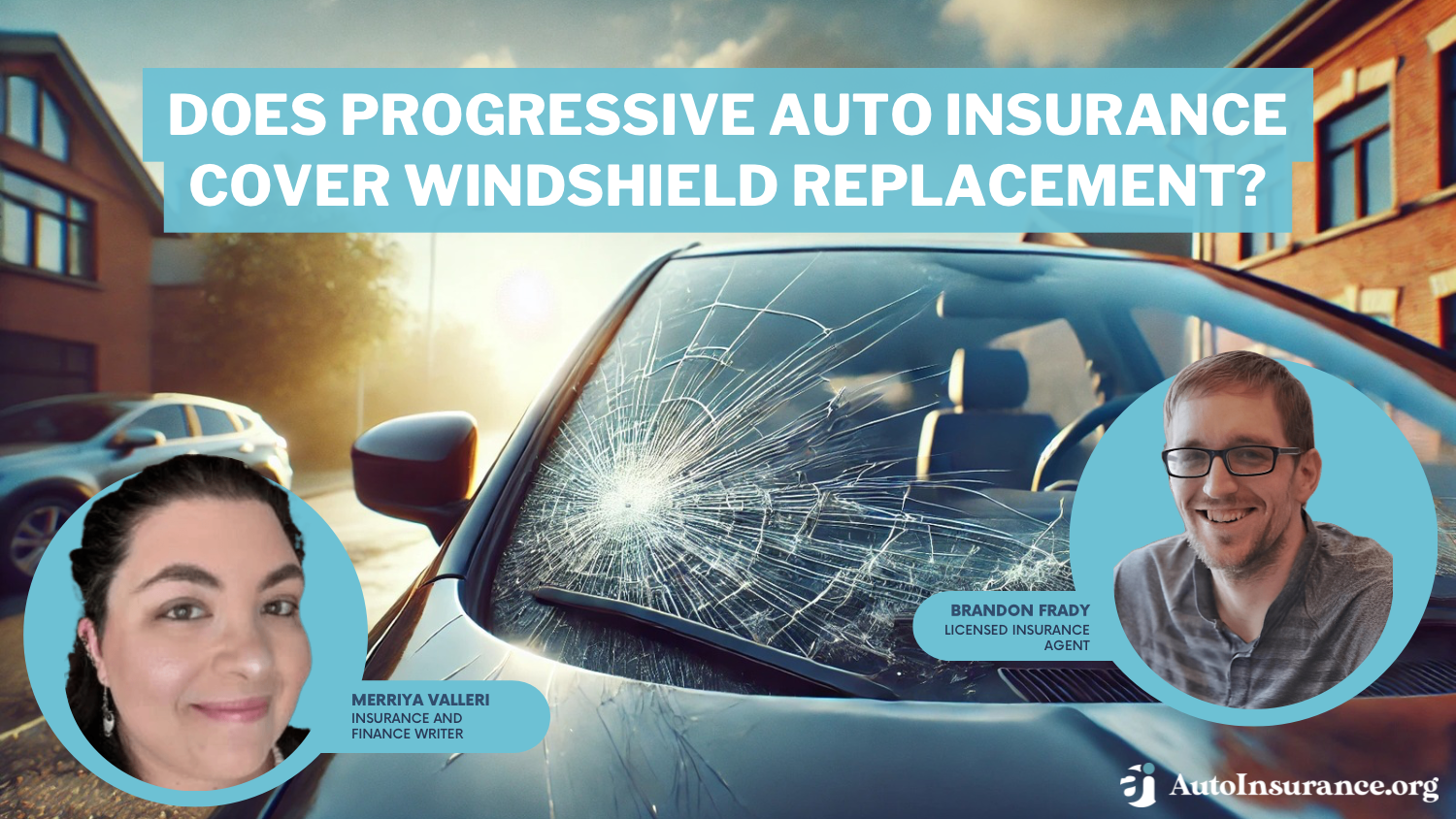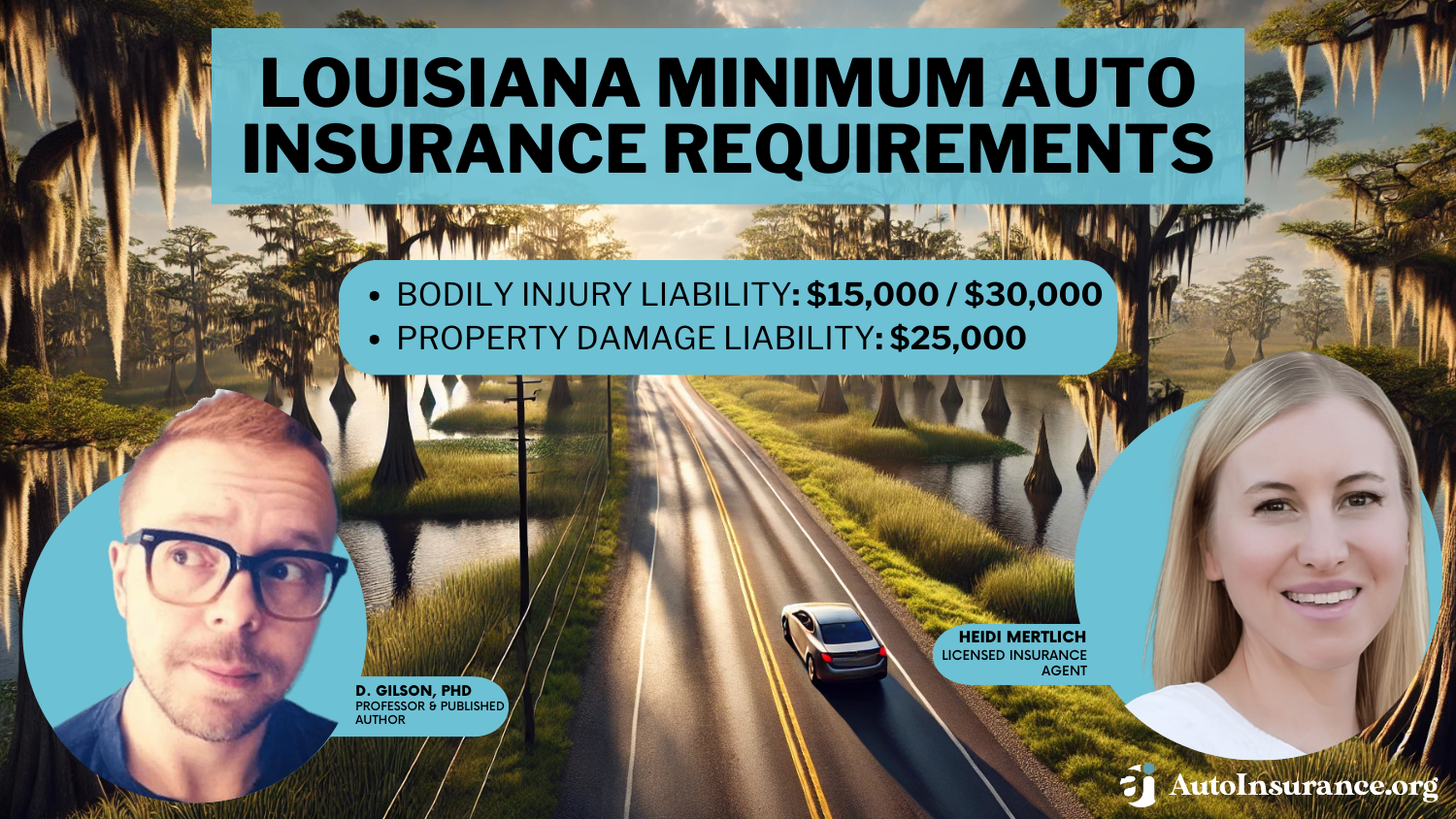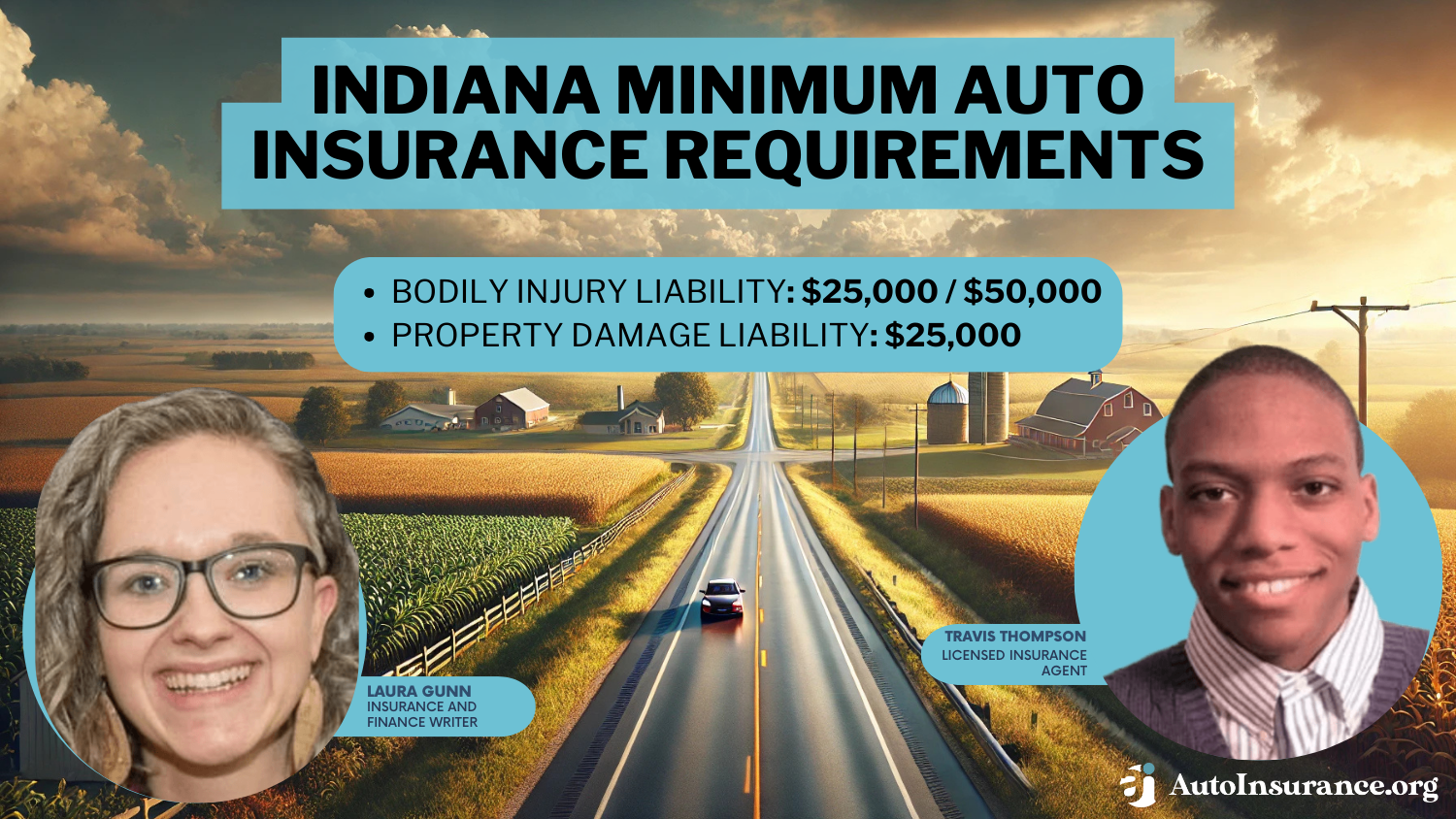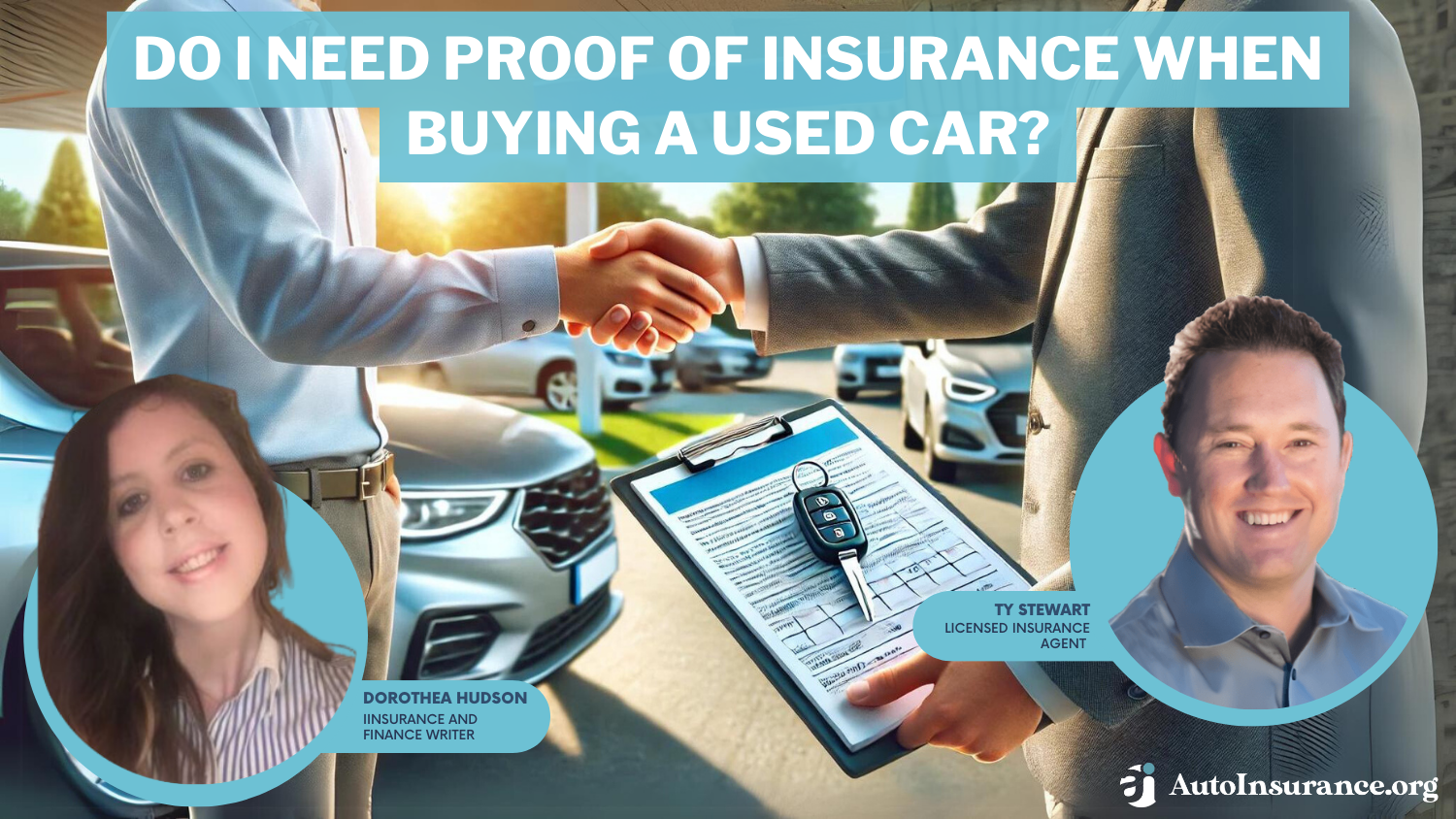Personal Injury Protection (PIP) Auto Insurance in 2026 (What it Means for Your Coverage)
Personal injury protection (PIP) auto insurance pays for health care expenses after an accident, no matter who was at fault. PIP insurance is an invaluable addition that starts at $20 per month. Unlike MedPay, PIP auto insurance covers lost wages and life services, like house cleaning and child care.
Read more Secured with SHA-256 Encryption




Table of Contents
Table of Contents


Licensed Insurance Agent
Brad Larson has been in the insurance industry for over 16 years. He specializes in helping clients navigate the claims process, with a particular emphasis on coverage analysis. He received his bachelor’s degree from the University of Utah in Political Science. He also holds an Associate in Claims (AIC) and Associate in General Insurance (AINS) designations, as well as a Utah Property and Casual...
Brad Larson


Licensed Insurance Agent
Travis Thompson has been a licensed insurance agent for nearly five years. After obtaining his life and health insurance licenses, he began working for Symmetry Financial Group as a State Licensed Field Underwriter. In this position, he learned the coverage options and limits surrounding mortgage protection. He advised clients on the coverage needed to protect them in the event of a death, critica...
Travis Thompson
Updated January 2025
Personal injury protection (PIP) auto insurance covers medical expenses and related costs for you and your passengers after an accident, regardless of who is at fault.
PIP auto insurance, often referred to as “no-fault” insurance, covers medical bills, lost wages, rehabilitation costs, and sometimes even funeral expenses. It is a requirement in some states and optional in others.
Read on to learn more about personal injury protection coverage, including if it’s required in your state. Then, enter your ZIP code into our free comparison tool to see the cheapest rates in your area.
- PIP covers medical costs for you and your passengers after an accident
- Personal injury insurance is required in 12 states
- Personal injury protection car insurance costs between $5 and $50 per month
What Personal Injury Protection Auto Insurance Covers
What is personal injury protection insurance, and what does PIP insurance cover? Personal injury protection helps pay for eligible expenses such as medical, funeral, disability, and rehabilitation costs. Typically, car insurance with Personal Injury Protection covers:
- Medical Expenses: PIP insurance covers hospital visits, surgeries, doctor’s appointments, and other necessary treatments for injuries after an accident.
- Lost Wages: If you cannot work due to accident-related injuries, PIP can help replace your lost income.
- Rehabilitation Costs: The rehabilitation portion of PIP coverage includes physical therapy or other rehabilitative services to aid recovery.
- Essential Services: PIP can cover costs for services you can’t perform due to injury, such as childcare, housekeeping, or yard work.
- Funeral Expenses: In the event of a fatality, PIP may help pay for funeral and burial costs. It also provides financial support to your dependents if you die.
If you’re worried about your auto insurance covering your passengers, PIP has you covered. Passengers are covered by PIP insurance, meaning your insurance will pay for your passengers as long as you are driving.
Free Insurance Comparison
Compare Quotes From Top Companies and Save
Secured with SHA-256 Encryption
Personal Injury Protection Coverage Rates
PIP insurance costs are usually low, with rates starting around $5 per month. However, many factors affect auto insurance, and some drivers see rates as high as $50 per month.
Comparing rates with multiple companies is the key to finding cheap PIP car insurance. To understand what you might pay, compare PIP and MedPay rates at the largest insurance companies below.
PIP and MedPay Monthly Auto Insurance Rates by Provider
| Company | PIP | MedPay |
|---|---|---|
| $25 | $5 | |
| $30 | $6 | |
| $27 | $5 | |
| $20 | $4 | |
 | $35 | $6 |
 | $22 | $5 |
| $23 | $5 | |
| $24 | $5 | |
| $26 | $5 | |
| $21 | $5 |
To compare PIP insurance rates, you’ll need personalized quotes. You can get a personalized quote by visiting the homepage of a provider you’re interested in and filling out the quote request form.
Then, you just need to request more quotes, which takes about 10 minutes each. If you want to save time, you can enter your ZIP code into our free comparison tool to see multiple companies at once.
When Personal Injury Protection Auto Insurance Applies
Personal injury protection auto insurance is a type of coverage that helps pay for medical expenses in several situations, including if:
- You or your passengers are injured in an accident.
- You’re injured as a passenger in someone else’s car.
- A car injures you while you’re walking or bicycling.
While it might sound similar to bodily injury liability auto insurance, PIP coverage is not the same.
Bodily injury insurance covers damage you cause to others in an at-fault auto accident, while PIP car insurance covers your medical needs.
Liability insurance only pays for injuries and damage you cause to others in an at-fault accident. It never covers your medical bills or car repairs. By contrast, personal injury protection, or PIP, helps cover medical bills regardless of fault.Scott W. Johnson Licensed Insurance Agent
Many states require PIP insurance coverage before you can drive, but you can also buy it in states that don’t. While it often covers some of the same medical events as your health insurance, PIP coverage is written explicitly for car-related injuries.
Difference Between PIP Auto Insurance and MedPay Coverage
You know what personal injury protection definitions include, but there’s a type of insurance that is very similar: medical payments. When you’re wondering what PIP coverage is, you’ll probably come across this popular type of insurance.
PIP insurance and medical payments (MedPay) are very similar. When you add MedPay to your policy, your insurance will pay for the following after an accident:
- Medical Bills: MedPay covers hospital visits, surgeries, X-rays, and other necessary treatments for injuries.
- Doctor Visits: Your coverage includes consultations and follow-up care with physicians or specialists.
- Emergency Medical Services: MedPay covers ambulance rides and emergency room stays.
- Funeral Expenses: MedPay may help cover funeral costs if the accident results in death.
- Dental Care: If dental injuries are caused by the accident, MedPay can cover the related expenses.
MedPay is often used to pay for medical costs not fully covered by health insurance or when immediate coverage is needed. However, it doesn’t cover lost wages, rehabilitation, or other non-medical costs like personal injury protection does.
So, do you need medical payment coverage on your auto insurance? MedPay isn’t required in any state, but it’s never bad to have more coverage. Speak with a representative from your insurance provider if you’re unsure about adding MedPay or PIP coverage to your policy.
Free Insurance Comparison
Compare Quotes From Top Companies and Save
Secured with SHA-256 Encryption
The Difference Between No-Fault and PIP Auto Insurance
PIP coverage and no-fault auto insurance sometimes refer to the same thing — it all depends on your state laws.
States have either no-fault or at-fault laws for car accidents. In no-fault states, your insurance covers your expenses after an accident, no matter who caused it. When damage crosses your state’s PIP threshold, then you can make a claim against the at-fault driver.
PIP insurance is often called no-fault coverage because it pays for medical bills and other costs, regardless of who caused the wreck. It applies before you can seek compensation from the other driver.Michelle Robbins Licensed Insurance Agent
In at-fault states, PIP coverage is not considered no-fault insurance. Instead, the at-fault driver’s bodily injury liability will likely pay for your medical bill before your PIP insurance kicks in.
Minimum PIP Auto Insurance Requirements by State
Now that you know what PIP is, you might be asking, “How much PIP do I need?” State laws about auto insurance determine how much PIP insurance you need and if you need it.
An insurance representative will know exactly how much PIP insurance is required in your state. If it's not a required coverage, they can also give you an idea of how much you should purchase for your own protection.Travis Thompson Licensed Insurance Agent
You can still buy PIP coverage if it’s not required, but only in select states. States like Arizona, California, and Tennessee allow insurance companies to sell MedPay insurance rather than PIP coverage.
Personal Injury Protection Coverage and Health Insurance
Although PIP insurance is valuable coverage, whether you need it depends on your state. There are 12 states that require PIP insurance, meaning you’ll have to file a PIP claim if you’re injured in an accident.
Personal Injury Protection. Is it worth it🤔? It might be required✅. Find out all about this no-fault option here👉: https://t.co/qMCFAzEKNY pic.twitter.com/J8KCaBaWr0
— AutoInsurance.org (@AutoInsurance) August 23, 2024
If you don’t live in a state that requires PIP, your health insurance won’t deny a claim from an auto accident. However, it won’t cover everything, especially if you need help with lost wages, funeral costs, or essential services.
Some states allow your PIP and health insurance to work together after a car accident. States like New Jersey and Michigan allow your health insurance to cover physical injuries while your PIP covers other losses. This will enable you to maximize your PIP coverage and health insurance simultaneously.
Regardless of whether your state requires you to carry it, PIP insurance is usually so affordable that it’s worth adding to your policy. At the very least, you should ask your insurance company how much PIP coverage would cost.
Free Insurance Comparison
Compare Quotes From Top Companies and Save
Secured with SHA-256 Encryption
How to File PIP Auto Insurance Claims
Learning how to file an auto insurance claim for PIP insurance is as simple as filing for any other type of coverage. Follow these easy steps to file a PIP claim:
- Report the Accident: Notify your insurance company as soon as possible, even if you believe you were not at fault. Most insurers require prompt reporting to process claims efficiently.
- Seek Medical Attention: Get medical care right away, even if injuries seem minor. PIP covers medical expenses, and having a medical report is crucial for your claim.
- Gather Necessary Information: Your insurance company will need details for your PIP claim, including things like lost wages, health care receipts, and accident reports.
- File Your Claim: Contact your insurance provider to file a PIP claim, either online or through a claims representative. Provide all the required documentation.
- Receive Payment: Your insurance company will either reimburse you or directly pay health care and service providers.
Keep in mind that PIP claims often have a time limit for filing, so be sure to check your policy’s guidelines to comply with the deadline.
Accidents happen😟, but the steps you take after a crash can make the difference in how you recover. https://t.co/27f1xf1ARb has the info you need to get the insurance claims process started🤳. Check it out👉: https://t.co/Ndz4m4Cpyd pic.twitter.com/PXHsFa65tU
— AutoInsurance.org (@AutoInsurance) September 11, 2023
If you’re wondering what happens when you make a personal injury claim, the process is a bit more detailed than filing other types of claims. You’ll likely be asked to provide evidence of your injury, medical bills, and the impact on your daily life, which can take a bit longer to process. Stay in close contact with your insurer and provide as much information as you can to keep things moving smoothly.
How PIP Auto Insurance Works With Your Policy
When you’re injured in an accident, your PIP insurance is usually exhausted before other parts of your policy kick in. For example, if someone hits you, your PIP will cover your medical expenses first if you live in a no-fault state.
If you reach the limit of your PIP insurance, you can then file a claim against the other driver’s liability insurance.
As for your insurance, you don’t have to wait until a PIP claim resolves before you can start other claims. If you need to file a collision auto insurance and PIP claim simultaneously, your insurance company can handle it.
Of course, there are times when you can skip a PIP claim and file a lawsuit against another driver instead. If your injuries are severe or permanently disabling, or if your medical expenses cross your state’s tort threshold, you don’t need to make a PIP claim.
Find the Best PIP Auto Insurance Rates Today
Personal injury protection (PIP) insurance is a valuable form of coverage that ensures prompt medical care and financial support following an accident. By covering medical expenses, lost wages, and other essential services, PIP provides comprehensive protection that goes beyond standard auto insurance policies.
Learning how to evaluate auto insurance quotes can help you find the cheapest auto insurance with PIP coverage, no matter what your situation looks like. Enter your ZIP code into our free comparison tool to see which company has the lowest rates for you.
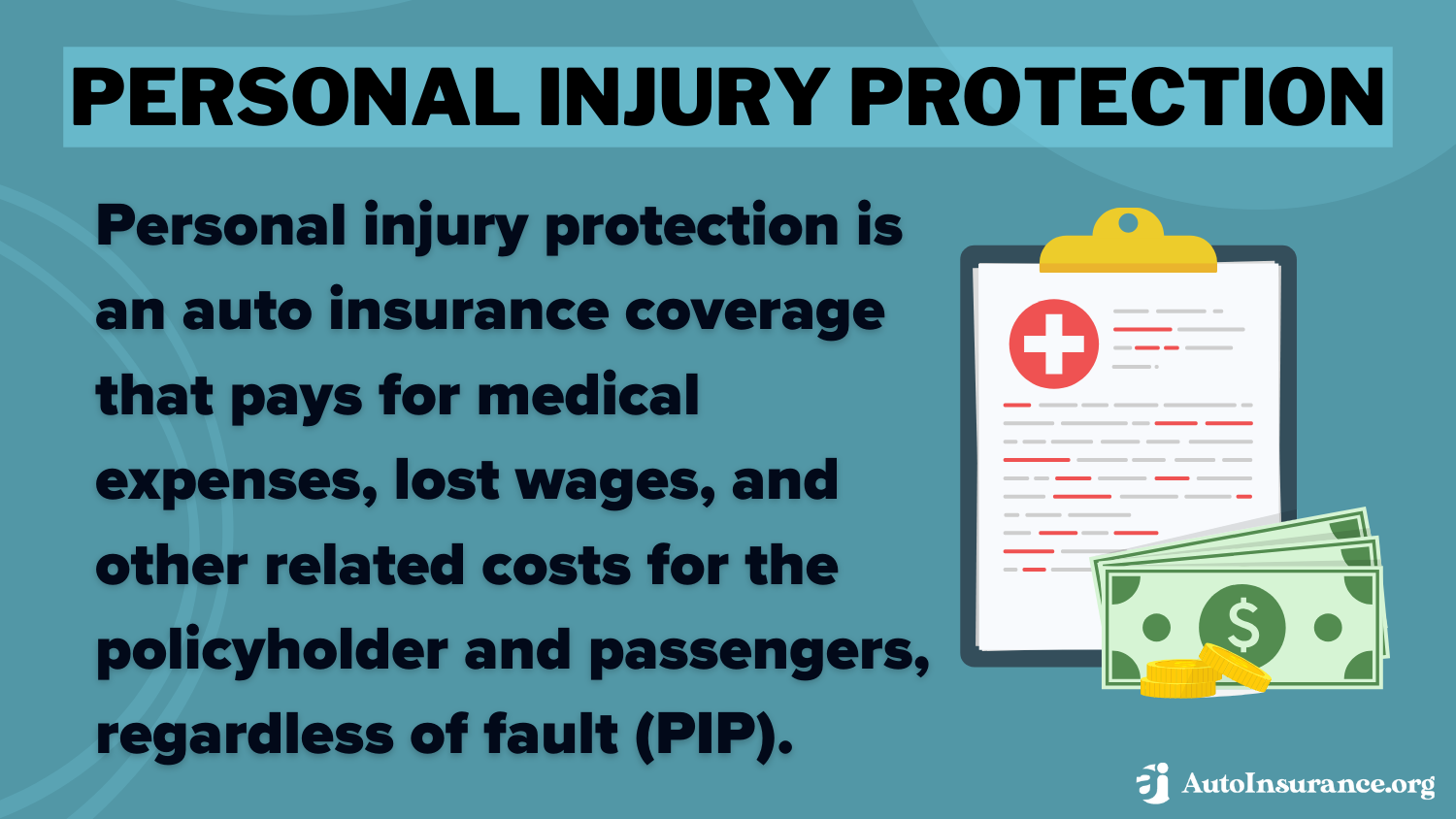
Frequently Asked Questions
What is personal injury protection coverage?
So, what is a PIP policy? Personal injury protection (PIP) is a type of car insurance coverage that helps pay for medical expenses, lost wages, and other accident-related costs, regardless of who is at fault. Often referred to simply as “PIP,” it’s required in 12 states and is generally affordable. If you’ve ever wondered, “What does PIP mean in car insurance?”—now you know it’s a safety net for unexpected injury costs after an accident.
What does PIP insurance stand for in auto insurance?
PIP stands for Personal Injury Protection, and its definition, or PIP insurance definition, refers to a type of auto insurance coverage that pays for medical expenses, lost wages, and other costs related to injuries from a car accident, regardless of fa
Should you use PIP insurance?
If you live in a state that requires it, you’ll need to get PIP insurance before you can drive. If your state does not require it, PIP coverage is still a good investment because it can save you thousands in medical bills if you’re injured in a car accident. Learning how to get auto insurance with PIP coverage can help you find an affordable plan.
What does personal injury mean in insurance?
In insurance, “personal injury” refers to injuries from accidents or unexpected events, often covered by policies like Personal Injury Protection (PIP) in auto insurance. PIP can help pay for medical bills, lost wages, and other costs, no matter who’s at fault. The term can also apply to legal cases involving accidents like slips and falls or workplace injuries.
What is the average payout for a personal injury claim in the USA?
In the U.S., the average payout for a personal injury claim typically ranges from $25,000 to $55,000. However, many people also wonder, “What is the highest PIP payment you can get?” The highest PIP payout can go as high as $50,000, though most policies will pay out between $10,000 and $25,000 for medical expenses, lost wages, and other costs associated with an injury
Is PIP coverage the same as bodily injury liability insurance?
No. PIP insurance covers medical expenses for you and your passengers after an accident, no matter who is at fault. It also covers your loss of income, funeral expenses, and essential services. Bodily injury liability insurance covers damage you cause to other people. Many drivers opt for the cheapest liability-only auto insurance policy to save, but it leaves their own health care costs uncovered.
What does personal injury protection cover?
So, what is covered under personal injury protection? PIP insurance typically covers the following expenses:
- Medical Expenses: PIP pays for medical treatment, hospital stays, surgeries, medication, and other related medical costs.
- Lost Wages: PIP provides coverage for a portion of lost income due to the injury, including time off work for medical treatment or recovery.
- Rehabilitation Costs: PIP may cover physical therapy, occupational therapy, or other forms of rehabilitation required after an accident.
- Funeral Expenses: In the unfortunate event of a fatal accident, PIP may cover funeral and burial expenses.
PIP insurance pays for the health care costs of your passengers as well, so no one in your car will have to worry about getting treatment after an accident.
Is PIP insurance mandatory?
PIP insurance requirements vary by state. Some states require drivers to carry PIP insurance as part of their auto insurance policy, while others offer it as an optional coverage. States that have “no-fault” insurance systems typically require PIP coverage.
How do personal injury protection vs. medical payments differ?
PIP insurance and medical payments coverage (MedPay) are similar in that they both cover medical expenses resulting from a car accident. However, there are a few key differences:
- PIP is usually broader in scope and covers a wider range of expenses, such as lost wages and rehabilitation costs, in addition to medical bills. MedPay typically covers only medical expenses.
- PIP coverage is mandatory in some states, while MedPay is optional in most states.
- PIP coverage pays out regardless of fault, while MedPay coverage typically requires someone to be at fault before a claim can be made.
The type of auto insurance you can buy depends on where you live. Insurance companies sell either PIP coverage or MedPay, depending on state law. You can enter your ZIP code into our free comparison tool to see which type is available where you live.
How much personal injury protection insurance do you need?
The amount of personal injury protection insurance you need depends on your individual circumstances, such as your state’s requirements, your health insurance coverage, and your budget.
How much does PIP insurance cost?
Who gets the PIP check?
Is PIP insurance worth it?
Does personal injury protection auto insurance cover physical therapy after a car accident?
Does a PIP claim increase car insurance rates?
Do you need PIP insurance if you have Medicare?
What is the difference between personal accident and personal injury?
Is PIP mandatory in Massachusetts?
Get a FREE Quote in Minutes
Insurance rates change constantly — we help you stay ahead by making it easy to compare top options and save.


